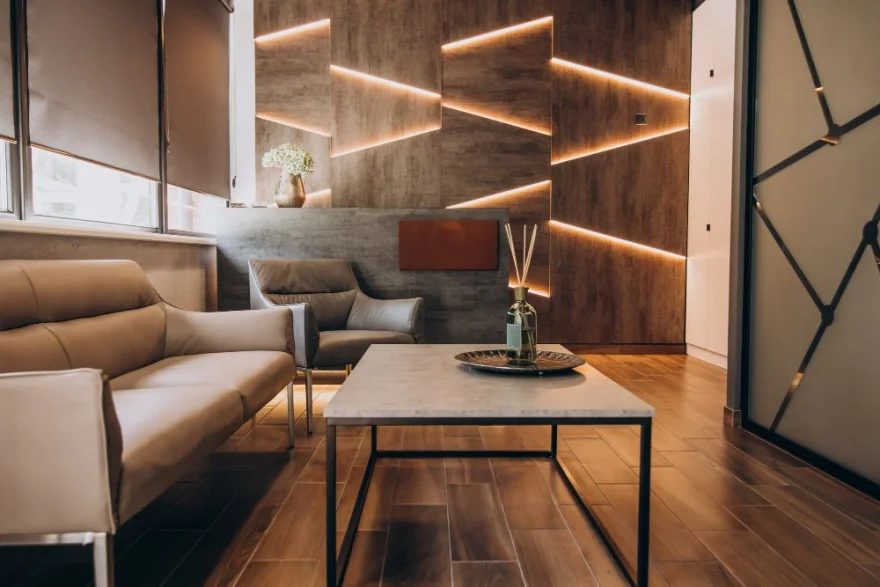Interior Design: Elevate Your Spaces to Be Elegant and Comfortable
Interior design involves arranging and coordinating a building's interior space, utilizing colors, furniture, lighting, and materials to enhance beauty and optimize functionality.
In the process of setting up a new home or workspace, interior design becomes a central focal point, taking the space to a higher level of sophistication and comfort.
In this article by DeCorner, we delve into the concept of interior design, underline its significance and practical applications, and spotlight prevailing trends. Join us as we open the door to considering investment in this field.
What is interior design?
Interior design is both an art and a science that involves planning, arranging, and coordinating the elements within a space to create a visually appealing and functional environment.
This discipline goes beyond mere decoration, as it considers how people will use and experience the space. Interior designers work with various elements such as colors, furniture, lighting, textures, and spatial arrangements to enhance the aesthetic appeal and optimize the functionality of a given space.
Their goal is to create environments that meet the needs and preferences of the occupants while adhering to principles of safety, accessibility, and sustainability. Interior design is applied in various settings, including homes, offices, commercial spaces, hospitality establishments, and more.
What is the importance of interior design?
There are numerous benefits to applying the principles of interior design, including:
1. Comfort Provision
Recognizing that the environment around individuals affects their mood and psychological well-being, interior design aims to create comfortable and refreshing spaces. It strives to establish an attractive environment where users feel calm and content.
2. Optimal Use of Space
The significance of interior design lies in organizing and directing the flow of movement within spaces effectively. Through practical distribution of furniture and decorative elements, it contributes to maximizing the use of available space.
As a result, interior design enhances the functionality of the place, improving the user experience and encouraging prolonged stays or increased productivity.
3. Emanation of Beauty and Joy
Interior design is fundamental in adding a delightful touch to a space. The thoughtful coordination of colors, appropriate furniture selection, and artistic spatial arrangement contribute to raising the aesthetic value of the area, uplifting mood, and fostering positivity.
4. Expression of Identity
Interior design plays a role in reinforcing the brand identity of commercial spaces and institutions. Moreover, it serves as an excellent means of self-expression and showcasing personal taste.
5. Increase in Property Value
Well-executed interior design can enhance the value of properties, whether residential homes or commercial spaces. By making them more attractive and elegant, it ensures they fulfill their functions optimally, ultimately adding value to the property.
Interior Design Trends – A World of Elegance
Interior design styles are constantly evolving with cultural shifts, technological advancements, and societal aspirations. However, several key trends can be identified in this field:
1. Sustainable Design
This trend focuses on increasing attention to sustainable materials and environmentally friendly designs, emphasizing recycling and efficient resource use.
2. Smart Interior Design
Smart interior design integrates technology into the space, incorporating artificial intelligence systems and smart home devices to enhance comfort and security.
3. Cost-Effective Interior Design
Many seek refreshing and practical decor for their spaces without unnecessary resource consumption. This trend caters to them by employing economical methods and materials to achieve a beautiful design that serves the purpose at a lower cost.
4. Nature-Integrated Interior Design
This approach merges elements of nature with interior spaces, utilizing plants, greenery, and natural materials to improve air quality and enhance mental well-being.
5. Multi-functional Space Design
With the rise of smaller living spaces in apartments and homes, the trend of designing multi-functional spaces continues to grow.
This innovative style allows for versatile and flexible use of space while maintaining elegance and keeping up with general decor trends.
6. Minimalist Decor
The simplicity of minimalist style shines among common interior design trends, distinguished by its ability to create a calm, balanced, and pure environment.
This approach relies on the use of simple geometric lines, neutral colors like white and gray, and a focus on practical and functional furniture.
Applications of Interior Design - Boundless Horizons
Interior design can encompass a wide range of projects tailored to the needs and desires of clients. Here are some examples:
· Homes and Apartments.
· Villas.
· Hotels.
· Resorts.
· Student Housing.
· Business Offices.
· Cafés.
· Restaurant Interior Design.
· Shopping Centers.
· Retail Stores.
· Hospitals.
· Medical Clinics.
· Schools and Educational Facilities.
· Theaters.
· Museums.
· Clubs and Fitness Centers.
Interior Design Companies: Where Your Dreams Come to Life
Interior design and interior architecture companies are committed to fulfilling the aspirations of their clients, transforming their dreams into a captivating reality by:
· Applying the principles of interior design and its rules.
· Capturing the essence of the client's personal style and carefully integrating it into the design.
· Using color coordination and lighting elements innovatively.
· Focusing on the use of furnishings and furniture that blend comfort with elegance.
With this integrated approach, interior design and decor companies can turn every space into a unique story, reflecting the client's identity and embodying their expectations, while perfectly serving its intended purpose.
Experience the finest interior design services in Istanbul with Decorner, the leading interior design company.
Contact us now and leave the rest to us!
Edited by: DeCorner©
Source: Britannica




Comments